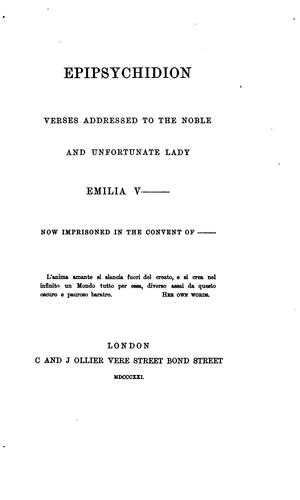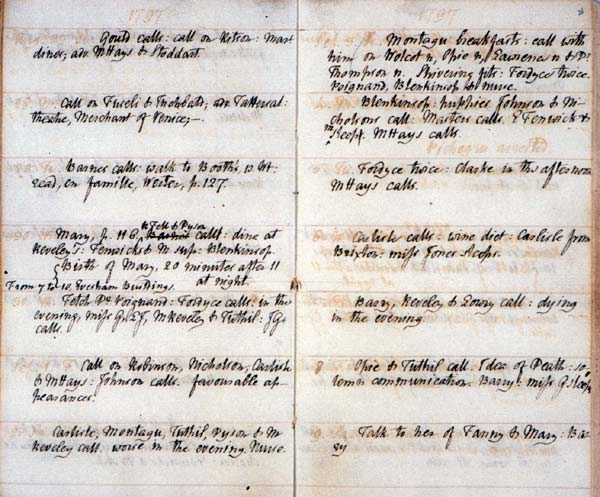|
Epipsychidion
''Epipsychidion'' is a major poetical work published in 1821 by Percy Bysshe Shelley. The work was subtitled: ''Verses addressed to the noble and unfortunate Lady Emilia V, now imprisoned in the convent of''. The title is Greek for "concerning or about a little soul", from ''epi'', "around", "about"; and ''psychidion'', "little soul". Background Countess Teresa Viviani, the daughter of the governor of Pisa, was nineteen years old. Her father had placed her in the Convent of Saint Anna. Shelley had visited her several times and had corresponded with her briefly. After the work was published by Charles and James Ollier in London, Shelley requested them to withdraw it. One possible concern was that readers would interpret the poem biographically. Shelley referred to it as "an idealized history of my life and feelings". The poem contains autobiographical elements, consisting of 604 lines written for Viviani, whom Shelley met while she was "imprisoned" in 1820. The theme of the wor ... [...More Info...] [...Related Items...] OR: [Wikipedia] [Google] [Baidu] |
Percy Bysshe Shelley
Percy Bysshe Shelley ( ; 4 August 17928 July 1822) was one of the major English Romantic poets. A radical in his poetry as well as in his political and social views, Shelley did not achieve fame during his lifetime, but recognition of his achievements in poetry grew steadily following his death and he became an important influence on subsequent generations of poets including Robert Browning, Algernon Charles Swinburne, Thomas Hardy, and W. B. Yeats. American literary critic Harold Bloom describes him as "a superb craftsman, a lyric poet without rival, and surely one of the most advanced sceptical intellects ever to write a poem." Shelly's reputation fluctuated during the 20th century, but in recent decades he has achieved increasing critical acclaim for the sweeping momentum of his poetic imagery, his mastery of genres and verse forms, and the complex interplay of sceptical, idealist, and materialist ideas in his work. Among his best-known works are "Ozymandias" (1818), "Ode ... [...More Info...] [...Related Items...] OR: [Wikipedia] [Google] [Baidu] |
Mary Shelley
Mary Wollstonecraft Shelley (; ; 30 August 1797 – 1 February 1851) was an English novelist who wrote the Gothic fiction, Gothic novel ''Frankenstein, Frankenstein; or, The Modern Prometheus'' (1818), which is considered an History of science fiction#Shelley and Europe in the early 19th century, early example of science fiction. She also edited and promoted the works of her husband, the Romantic poet and philosopher Percy Bysshe Shelley. Her father was the political philosopher William Godwin and her mother was the philosopher and women's rights advocate Mary Wollstonecraft. Mary's mother died less than a fortnight after giving birth to her. She was raised by her father, who provided her with a rich if informal education, encouraging her to adhere to his own anarchist political theories. When she was four, her father married a neighbour, Mary Jane Clairmont, with whom Mary came to have a troubled relationship. In 1814, Mary began a romance with one of her father's politica ... [...More Info...] [...Related Items...] OR: [Wikipedia] [Google] [Baidu] |
Free Love
Free love is a social movement that accepts all forms of love. The movement's initial goal was to separate the state from sexual and romantic matters such as marriage, birth control, and adultery. It stated that such issues were the concern of the people involved and no one else. The movement began around the 19th century, and was advanced by hippies during the Sixties. Principles Much of the free love tradition reflects a liberal philosophy that seeks freedom from state regulation and church interference in personal relationships. According to this concept, the free unions of adults (or persons at or above the age of consent) are legitimate relations which should be respected by all third parties whether they are emotional or sexual relations. In addition, some free love writing has argued that both men and women have the right to sexual pleasure without social or legal restraints. In the Victorian era, this was a radical notion. Later, a new theme developed, linki ... [...More Info...] [...Related Items...] OR: [Wikipedia] [Google] [Baidu] |
Love Poems
Poetry (derived from the Greek ''poiesis'', "making"), also called verse, is a form of literature that uses aesthetic and often rhythmic qualities of language − such as phonaesthetics, sound symbolism, and metre − to evoke meanings in addition to, or in place of, a prosaic ostensible meaning. A poem is a literary composition, written by a poet, using this principle. Poetry has a long and varied history, evolving differentially across the globe. It dates back at least to prehistoric times with hunting poetry in Africa and to panegyric and elegiac court poetry of the empires of the Nile, Niger, and Volta River valleys. Some of the earliest written poetry in Africa occurs among the Pyramid Texts written during the 25th century BCE. The earliest surviving Western Asian epic poetry, the ''Epic of Gilgamesh'', was written in Sumerian. Early poems in the Eurasian continent evolved from folk songs such as the Chinese ''Shijing'', as well as religious hymns (the Sanskrit ''R ... [...More Info...] [...Related Items...] OR: [Wikipedia] [Google] [Baidu] |
English Poetry
This article focuses on poetry from the United Kingdom written in the English language. The article does not cover poetry from other countries where the English language is spoken, including Republican Ireland after December 1922. The earliest surviving English poetry, written in Anglo-Saxon, the direct predecessor of modern English, may have been composed as early as the 7th century. The earliest English poetry The earliest known English poem is a hymn on the creation; Bede attributes this to Cædmon ( fl. 658–680), who was, according to legend, an illiterate herdsman who produced extemporaneous poetry at a monastery at Whitby. This is generally taken as marking the beginning of Anglo-Saxon poetry. Much of the poetry of the period is difficult to date, or even to arrange chronologically; for example, estimates for the date of the great epic ''Beowulf'' range from AD 608 right through to AD 1000, and there has never been anything even approaching a consensus. It is pos ... [...More Info...] [...Related Items...] OR: [Wikipedia] [Google] [Baidu] |
Works About Marriage
Works may refer to: People * Caddy Works (1896–1982), American college sports coach * Samuel Works (c. 1781–1868), New York politician Albums * '' ''Works'' (Pink Floyd album)'', a Pink Floyd album from 1983 * ''Works'', a Gary Burton album from 1972 * ''Works'', a Status Quo album from 1983 * ''Works'', a John Abercrombie album from 1991 * ''Works'', a Pat Metheny album from 1994 * ''Works'', an Alan Parson Project album from 2002 * ''Works Volume 1'', a 1977 Emerson, Lake & Palmer album * ''Works Volume 2'', a 1977 Emerson, Lake & Palmer album * '' The Works'', a 1984 Queen album Other uses * Microsoft Works, a collection of office productivity programs created by Microsoft * IBM Works, an office suite for the IBM OS/2 operating system * Mount Works, Victoria Land, Antarctica See also * The Works (other) * Work (other) Work may refer to: * Work (human activity), intentional activity people perform to support themselves, others, or the community ** ... [...More Info...] [...Related Items...] OR: [Wikipedia] [Google] [Baidu] |
1821 Poems
Eighteen or 18 may refer to: * 18 (number), the natural number following 17 and preceding 19 * one of the years 18 BC, AD 18, 1918, 2018 Film, television and entertainment * ''18'' (film), a 1993 Taiwanese experimental film based on the short story ''God's Dice'' * ''Eighteen'' (film), a 2005 Canadian dramatic feature film * 18 (British Board of Film Classification), a film rating in the United Kingdom, also used in Ireland by the Irish Film Classification Office * 18 (''Dragon Ball''), a character in the ''Dragon Ball'' franchise * "Eighteen", a 2006 episode of the animated television series ''12 oz. Mouse'' Music Albums * ''18'' (Moby album), 2002 * ''18'' (Nana Kitade album), 2005 * '' 18...'', 2009 debut album by G.E.M. Songs * "18" (5 Seconds of Summer song), from their 2014 eponymous debut album * "18" (One Direction song), from their 2014 studio album ''Four'' * "18", by Anarbor from their 2013 studio album '' Burnout'' * "I'm Eighteen", by Alice Cooper commonly r ... [...More Info...] [...Related Items...] OR: [Wikipedia] [Google] [Baidu] |
Enlightened
Enlightened may refer to: * ''Enlightened'' (TV series), an American comedy-drama * ''Enlightened'' (album), 2007, by Dynamic Duo * The Enlightened, a faction in ''Ingress'' (video game) See also * Enlightened self-interest, a philosophy in ethics * Enlightenment (other) {{disambiguation ... [...More Info...] [...Related Items...] OR: [Wikipedia] [Google] [Baidu] |
Connoisseur
A connoisseur ( French traditional, pre-1835, spelling of , from Middle-French , then meaning 'to be acquainted with' or 'to know somebody/something') is a person who has a great deal of knowledge about the fine arts; who is a keen appreciator of cuisines, fine wines, and other gourmet products; or who is an expert judge in matters of taste. In many areas, the term now has an air of pretension, and may be used in a partly ironic sense. In the art trade, however, expert connoisseurship remains a crucial skill for the identification and attribution to individual artists of works by the style and technique, where documentary evidence of provenance is lacking. The situation in the wine trade is similar, for example in assessing the potential for ageing in a young wine through wine tasting. Connoisseurship in art "The ability to tell almost instinctively who painted a picture is defined ... as connoisseurship". Connoisseurs evaluate works of art on the basis of their experie ... [...More Info...] [...Related Items...] OR: [Wikipedia] [Google] [Baidu] |
Bodleian Library
The Bodleian Library () is the main research library of the University of Oxford, and is one of the oldest libraries in Europe. It derives its name from its founder, Sir Thomas Bodley. With over 13 million printed items, it is the second-largest library in Britain after the British Library. Under the Legal Deposit Libraries Act 2003, it is one of six legal deposit libraries for works published in the United Kingdom, and under Irish law it is entitled to request a copy of each book published in the Republic of Ireland. Known to Oxford scholars as "Bodley" or "the Bod", it operates principally as a reference library and, in general, documents may not be removed from the reading rooms. In 2000, a number of libraries within the University of Oxford were brought together for administrative purposes under the aegis of what was initially known as Oxford University Library Services (OULS), and since 2010 as the Bodleian Libraries, of which the Bodleian Library is the largest comp ... [...More Info...] [...Related Items...] OR: [Wikipedia] [Google] [Baidu] |
Ixion
In Greek mythology, Ixion ( ; el, Ἰξίων, ''gen''.: Ἰξίονος means 'strong native') was king of the Lapiths, the most ancient tribe of Thessaly. Family Ixion was the son of Ares, or Leonteus, or Antion and Perimele, or the notorious evildoer Phlegyas, whose name connotes "fiery". Peirithoös was his son (or stepson, if Zeus were his father, as Zeus claims to Hera in ''Iliad'' 14). Background Ixion married Dia, a daughter of Deioneus (or Eioneus), and promised his father-in-law a valuable present. However, he did not pay the bride price, so Deioneus stole some of Ixion's horses in retaliation. Ixion concealed his resentment and invited his father-in-law to a feast at Larissa. When Deioneus arrived, Ixion pushed him into a bed of burning coals and wood. These circumstances are secondary to the fact of Ixion's primordial act of murder; it could be accounted for quite differently: in the '' Greek Anthology'' (iii.12), among a collection of inscriptions from a ... [...More Info...] [...Related Items...] OR: [Wikipedia] [Google] [Baidu] |




.jpg)

.png)

